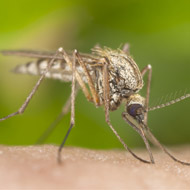African cattle aid infectious disease study

The findings help explain how African cattle survive in a region where European cattle quickly fall victim to East Coast Fever.
African cattle could hold the key to fighting parasitic diseases in humans, research led by the University of Edinburgh suggests.
Scientists discovered that cows are protected from a parasite that causes deadly East Coast Fever if they have been infected with a closely related but milder species of the parasite earlier in life.
The findings may lead to the development of new strategies for preventing parasitic disease, including severe malaria infection in humans.
In the study, the research team tracked the health of 500 Kenyan calves from birth to one year old. They put together a unique set of data on the cattle's survival, growth, health and infection with bacteria, viruses, tick-borne parasites and worms.
They found that death caused by East Coast Fever, the biggest killer of East African cattle, dropped 89 per cent among calves also infected with other species of parasites that do not cause disease.
The researchers say that a similar situation may happen when humans are infected with the parasite that causes severe malaria (Plasmodium falciparum) at the same time as a less aggressive species (Palmodium vivax), making people more likely to survive the disease.
Published in the journal Science Advances, the findings help explain how African cattle survive in a region where European cattle quickly fall victim to East Coast Fever.
It is thought that controlling the disease would benefit an estimated 30 million cattle in sub-saharan Africa, which would have a huge impact on the economy and health of local farmers.
The researchers suggest that vaccinating calves with benign parasite species could give them time to develop immunity to more aggressive species.
Commenting on the study, Professor Mark Woolhouse from the University's Centre for Immunity, Infection and Evolution, said: "This discovery suggests a completely new way to control a devastating disease in cattle, while reducing the use of antibiotics and environmentally damaging pesticides at the same time. It may also provide clues to new ways of combating human diseases such as malaria."



 The Animal and Plant Health Agency (APHA) has updated its online reporting service for dead wild birds.
The Animal and Plant Health Agency (APHA) has updated its online reporting service for dead wild birds.